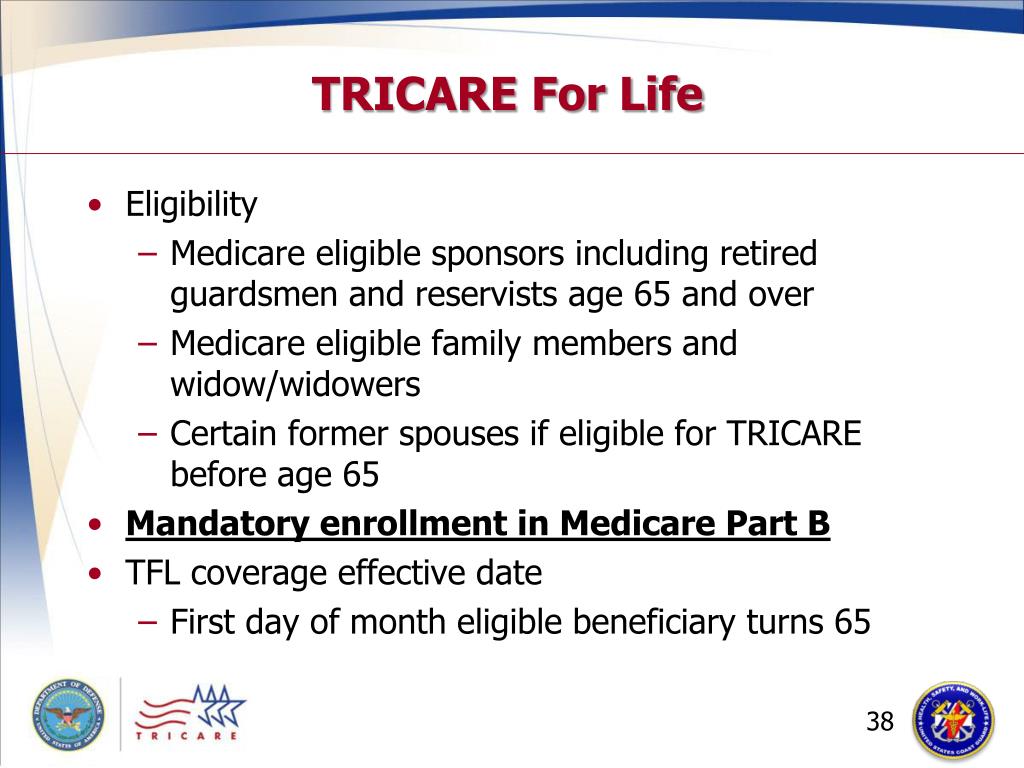As you approach the golden years of retirement, ensuring comprehensive healthcare coverage becomes a top priority. For military retirees and their spouses, the TRICARE for Life (TFL) program offers a valuable solution. However, understanding the intricacies of TFL, particularly when it comes to spouse coverage, is crucial to making informed decisions about your healthcare needs.
What is TRICARE for Life?
TRICARE for Life is a Medicare-wraparound coverage plan designed specifically for eligible military retirees and their spouses. It provides comprehensive healthcare coverage by working in tandem with Medicare Parts A and B. When you receive care covered by both Medicare and TRICARE, Medicare pays first, and TFL covers the remaining out-of-pocket costs, such as deductibles and coinsurance.
Spouse Eligibility for TRICARE for Life
As a military retiree, your eligibility for TFL is contingent upon your entitlement to Medicare Part A and Part B, regardless of your age. However, the eligibility criteria for your spouse may differ slightly. Here’s what you need to know:
Eligibility During the Retiree’s Lifetime
If you, as the military retiree, are eligible for Medicare Part A and Part B, your spouse will automatically be eligible for TFL coverage as well, provided they are also entitled to Medicare Part A and Part B.
It’s important to note that TFL is an individual entitlement, meaning that coverage is specific to the person who has both Medicare Part A and Part B. If your spouse is not yet eligible for Medicare, they can remain enrolled in their current TRICARE health plan, such as TRICARE Prime or TRICARE Select, until they become eligible for Medicare.
Eligibility After the Retiree’s Passing
In the unfortunate event of the military retiree’s passing, the surviving spouse’s eligibility for TFL remains intact, provided they do not remarry (unless the new spouse is also a retired service member). Once the surviving spouse becomes eligible for Medicare Part A and Part B, they will automatically transition to TFL coverage.
It’s important to note that this eligibility applies to spouses of military retirees who retired from active duty service. The eligibility rules may differ for spouses of non-retired service members or reservists.
Enrollment and Costs
One of the advantages of TFL is that there is no separate enrollment process or enrollment fee. Your coverage is automatic once you have both Medicare Part A and Part B and are listed as TRICARE-eligible in the Defense Enrollment Eligibility Reporting System (DEERS).
However, you and your spouse will be responsible for paying the Medicare Part B premiums to maintain TFL coverage. If you or your spouse are enrolled in a TRICARE Prime or TRICARE Select plan, your annual enrollment fee may change based on the number of family members enrolled in the plan.
Resources and Support
Navigating the intricacies of TRICARE for Life and Medicare can be daunting, but there are resources available to help you understand the program and make informed decisions:
- The TRICARE for Life Handbook: This comprehensive guide provides detailed information about TFL eligibility, coverage, costs, and how to get care.
- TRICARE and Medicare Turning Age 65 Brochure: This brochure is specifically designed to help you understand the transition to TFL when you turn 65.
- TRICARE Webinars and Podcasts: TRICARE regularly hosts webinars and podcast episodes focused on TFL and related topics, allowing you to learn from experts in the field.
Additionally, you can contact your TRICARE contractor or seek assistance from a TRICARE representative if you have any specific questions or concerns.
Ensuring comprehensive healthcare coverage during your retirement years is a top priority, and TRICARE for Life offers a valuable solution for military retirees and their spouses. By understanding the eligibility criteria, enrollment process, and available resources, you can navigate the complexities of TFL with confidence and peace of mind.
Tricare!| Everything You Need To Know As A Military Spouse
FAQ
Do spouses get TRICARE for life after retirement?
Does my wife get TRICARE for life when she turns 65?
Do military spouses automatically get TRICARE?
Who is eligible for TRICARE for life coverage?

